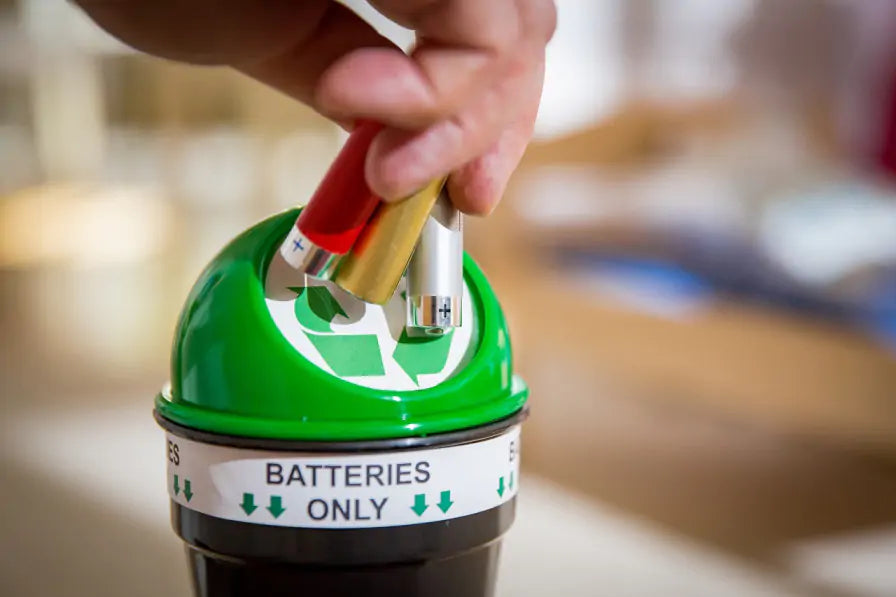OR
Express Checkout

Hands up who has a drawer at home full of random things that don’t have a place anywhere? Does the drawer have about 50 batteries in it, some that work, and some that don’t, because you’re just not sure what to do with them when they’re finished with?
Well, you’re not alone. Most of us know that batteries can’t be thrown in the bin, and many people aren’t sure whether they can be recycled, so they end up in ‘the drawer.’
In this blog, we’re going to clear up exactly what you should do with batteries and how our battery recycling bins can help you.
Batteries: The facts
Sorting batteries makes the recycling process easier
There are many different ways of recycling batteries, but whatever method is used, the aim is the same; to recover as much of the raw materials as possible. This is where sorting batteries into different types before recycling comes in. Batteries are made from different materials with different properties, such as lithium-ion, zinc, or nickel-cadmium and if the batteries are sorted into their different types, more of the raw materials can be successfully recovered.
Battery types and recovered materials uses
Here are the most common types of batteries and what their recovered raw materials can be used for:
Lead Acid Batteries: Used in cars and forklift trucks. The raw materials in these batteries are lead, Polypropylene and Gypsum. The materials can be used to make new lead acid batteries, battery cases, filler for plasterboard, and more.
Nickel Cadmium: Used in power tools. The raw materials in these batteries are nickel, steel, and cadmium. They can be used in metal plating, the steel industries, and to make new batteries.
Zinc-based Batteries: These are the ones you’re most likely to use at home. They contain steel, zinc, and manganese, and they can be used in the steel industry and in many other industrial applications.
Nickel Metal Hydride: These batteries are used in mobile phones and contain nickel and steel. They are commonly reused in the steel industry.
Lithium Ion: You’ll find these batteries in laptops. They contain cobalt and steel, and they are often reused in electronics, to make new batteries, in paint manufacturing, and in the steel industry.
Our battery recycling bins
Our Battery Recycling Bins are designed to provide a safe storage solution in public areas such as schools, shopping centres, workshops, offices, and other business premises where used batteries are disposed.
They are made from the highest quality materials, they’re fitted with tamperproof lids, and the bins in our exclusive online collection come in sizes ranging from just 3 litres to 52 litres to suit the needs of any working environment. The bins are designed to contain any leaks so you don’t need to worry about the hazards that are inherent when dealing with this type of waste.

Our Battery Pod Recycling Bins are made in the UK and manufactured from medium density polyethylene, a 100% recycled plastic. They are fitted with a WRAP compliant colour-coded lid and graphics to ensure they are used correctly.
They’re perfect for workplaces where batteries are disposed of on a regular basis, such as offices, workshops, factories, and public areas such as supermarkets. The pods are available in three sizes ranging from 10 to 30 litres, and they’re designed to safely store batteries until they are collected or taken to a recycling bank.
Our 52 Litre Battery Recycling Bin is most often used in schools, shopping centres, and recycling facilities, and it provides safe storage for used batteries. It’s made from a blend of polyethylene and recycled plastics, and it has a removable plastic inner liner, a lockable lift-off lid, and a specially designed opening to prevent unauthorised access.
It’s available to buy with or without the*Be Positive graphic, and there’s a choice of 12 different colours so you can be sure that you’ll find a bin to complement every environment. Optional ground fixing bolts are available to buy separately.
Our 3 Litre Coloured Battery Recycling Bin is a safe way to store batteries at school or at home. It’s fitted with a child-proof safety device to keep used batteries and their hazardous chemicals and components firmly out of the reach of young children.
It’s lightweight and compact, made from 100% recyclable plastic, and fitted with a specially designed lid with a twist off cap in the centre for the disposal of button cells and small batteries. To dispose of larger batteries, or for emptying the bin at the recycling station, the lid twists off completely for quick and easy disposal. The bin is dishwasher safe and child-proof, so it’s pretty much the perfect storage solution for batteries.